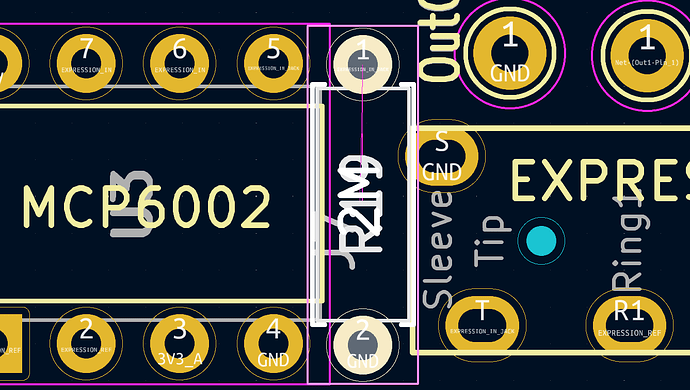This is a copy and paste from the pedalpcb forum, but wanted to add this info here as well. Short story is after building the 3.1 version of the Funbox pcb using a pcbway board, I was getting some weird noise on the right channel. I tried using different op amps and found one that fixed the problem and improved overall noise in comparison with the TL074, which was the MCP6024
And here’s that post:
“After some further testing with the MCP6024 quad op amp, I’m really pleased with the (lack of) noise level, compared with the TL074. I know noise has been an ongoing issue with the Daisy Seed in a buffered guitar pedal, especially with the rev 7. I’d be curious if the dual op amp version (MCP6022) lends any improvement for the Terrarium.
I’m mostly shooting in the dark, but a couple of things in the spec stand out from the TL072/TL074:
MCP6024 is rail to rail, and has a lower voltage range (2.5V to 5.5V). This lower voltage range would not do well for an analog pedal (much less headroom), but it works great for the Daisy Seed and it’s lower input audio voltage requirements. Gain bandwidth (10MHz vs 5.5MHz) and Slew Rate (7V/µs vs 13V/µs) are significantly different, but I don’t know what that means. Also, I noticed on the TL074, the minimum Voltage Supply Span is 10v according to the spec on the Digikey page. I’m only providing 5v power in the Funbox, so possibly I was using it out of spec? Assuming that means what I think it means.
I’ve tried the MCP6024 in the Funbox with a variety of outputs, going into a tube amp, into an audio interface, and directly into headphones, and all are very quiet in terms of noise.
Some of the other op amps I tried and their perceived results:
MCP6004: Same noise issue/level as TL074
MCP6274: Same noise issue/level as TL074
LM324AN: Much worse noise than TL074
Note that I’m not saying these are “bad” op amps, I’m only saying that in this particular circuit, in the Funbox, this is the result I got. I’m sure there’s a logical reason for each of these results, but my electronics/op amp knowledge it too limited to understand why. Any expertise from anyone on the topic of op amps would be greatly appreciated!”
![]() ). It’s an open source guitar pedal using the Daisy Seed on a through hole PCB, with buffered stereo in/out, expression, and midi capability. The Kicad files for the pcb, along with some software I’ve developed for it can be found here:
). It’s an open source guitar pedal using the Daisy Seed on a through hole PCB, with buffered stereo in/out, expression, and midi capability. The Kicad files for the pcb, along with some software I’ve developed for it can be found here:




